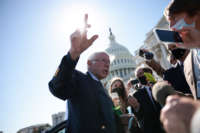
As the GOP condemns party members who voted for the infrastructure bill in last week’s House vote, Republican Rep. Fred Upton (Michigan) has shared a voicemail he received over his “yes” vote from an angry caller who threatened his life.
The message, which was obtained by The Detroit News, is riddled with profanities and expresses vitriol over Upton’s vote. “I hope you die. I hope everybody in your fucking family dies,” the caller says, before wishing death on Upton’s staff. According to The Detroit News, the caller is from South Carolina — outside of Upton’s state.
Within the 30-second voicemail, the caller refers to Upton as a “traitor” multiple times, echoing language from a post by right-wing extremist Rep. Marjorie Taylor Greene (R-Georgia), who called him and the 12 other GOP members who voted for the bill “traitors.”
Upton says that he’s gotten several death threats and over 1,000 calls to his office since Greene shared his number on Twitter and encouraged her followers to contact the members of Congress. In response to hearing about the voicemail, the Georgia lawmaker dubiously claimed not to condone death threats before posting Upton’s phone number on Twitter for a second time, appearing to encourage her followers to send even more death threats.
Upton says that threats have been pouring into his office ever since he voted to impeach Donald Trump in January. Numerous Republican representatives reported getting death threats directly before the impeachment vote, and some even said they felt they had to vote against impeachment because of the calls and voicemails threatening their lives.
Other Republicans have also expressed frustration over the infrastructure vote, condemning the Republicans who voted for the extremely watered-down infrastructure bill that was negotiated by members of their own party. Some conservatives like Rep. Lauren Boebert (R-Colorado) have called for punishing the members who supported the legislation by stripping them of committee assignments or mounting primary challenges against them, presumably by someone further to the right.
This is all despite the fact that the infrastructure bill was negotiated specifically to appease Republicans and Democrats sympathetic to their cause, like conservative Democrat Sen. Joe Manchin (West Virginia). The bill seeks to mildly improve infrastructure like roads and highways — a goal previously championed by Trump himself. Of course, the far right Republicans are likely upset over party members backing any measure supported by the Biden administration.
Death threats and harassment have been prevalent among the far right for years. Last year, right-wingers threatened poll workers, government agencies and left-wing protesters. It’s not uncommon for progressive lawmakers to get death threats or be harassed. But concerningly, encouraging harassment appears to be an increasingly popular far right strategy to threaten political opponents and whip party members in order — and the tactic has recently been employed by members of Congress themselves.
Rep. Alexandria Ocasio-Cortez (D-New York) is a common target of harassment; at least one of the far right militants who attacked the Capitol in January stated that they wanted to “assassinate AOC.” This week, however, Ocasio-Cortez was the recipient of what appears to be a violent threat from a fellow member of Congress: Rep. Paul Gosar (R-Arizona).
Earlier this week, Gosar tweeted a video depicting an animated version of him killing Ocasio-Cortez. But although the New York lawmaker often gets threatened by members of Congress, there has never been any consequences for this behavior.
This post was originally published on Latest – Truthout.





























